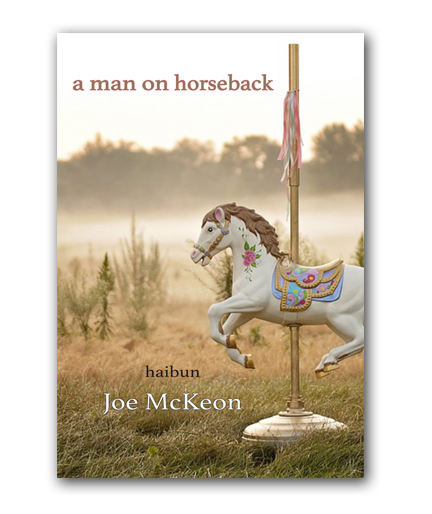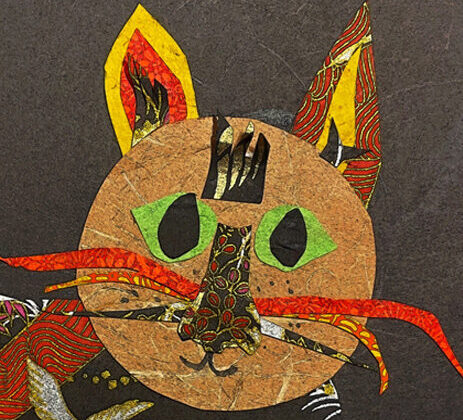
Book Review: a man on horseback
By Joe McKeon
Red Moon Press
Winchester, Virginia
2024, paperback, 100 pages
ISBN: 978-1-958408-52-0
$20 USD
Ordering Information
Reviewed by Peter Newton
Joe McKeon sets an autobiographical tone from the very first page of his new book of haibun, a man on horseback. The readers understand that they are in for a self-effacing, humorous character study in the pages that follow. Certainly, the book is highly personal to its author, as expressed in the dedication:
To my wife
who, when asked how she could marry someone
with so many flaws, replied,“A man on horseback wouldn’t notice.”

a man on horseback is in some ways a survey of one man’s opinions on a wide variety of topics–from the current political divide in the United States, the recent pandemic, and corporate business attire to cave exploration and vintage cartoons, to mention a handful. While the collection’s narrative arc follows the life of its author—there is almost a journal-like quality—the sheer variety of topics on display allows the book to be read out of order. Any one page offers a self-contained vignette.
That being said, this book comes with instructions in the Foreword, perhaps to inform the reader who is new to the haibun form, or to remind others of the goals of the genre. McKeon lays out the rules. He writes: “The goal of haibun is to release sparks through the juxtaposition of key elements.” These elements are the three basic components that make up a haibun: the prose, the haiku and the title.
Overall, I would say the author succeeds in releasing plenty of tangential connections, or “sparks,” throughout the book’s 81 haibun. He also displays his curiosity, sharp observational skills, and humor. Here’s one drawn from his childhood:
cracked
drive-in movie. a children’s playground next to the screen. our parents don’t mind taking us. a Hitchcock thriller? no problem. until the shower scene.
almost home
an M&M melts
in my mouth
Several pieces in McKeon’s collection address the universal human condition in astute and insightful ways. For example, his haibun “Miracles” highlights a familiar scene in America: a bunch of old guys hanging out at the local fast food joint over coffee. But there’s more to these human interactions than meets the eye.
Miracles
They meet in small towns and big cities across the nation. Their daily routine part of life’s affirmation. It’s more than just a reason to rise. They need to be seen. to be heard. to be recognized. While sipping on senior coffees and with sparkles in their eyes, they argue politics and sports and laugh at the biggest lies. No topic is unimportant. No position too extreme. It’s the friendship that matters most. It’s about camaraderie. They talk of their brides, careers, children, and hobbies. Magically they become virile young men disguised in geriatric bodies.golden arches
each man’s war
on his hat
What lies beneath these hats that bear the symbols of wartime brotherhood, whether army, navy, air force or marines, are the men who long for what any of us might—bygone days of strength and youth. Simultaneously, the reader perceives the haiku as a comment on income inequality. The minimum-wage worker wearing the cap with McDonald’s golden arches” is included in the plight of the older men gathered at the restaurant. The hourly-wage worker is, perhaps, fighting his own war on poverty. McKeon has given the reader a fresh new perspective on a familiar scene, as experienced from multiple perspectives. That’s the challenge of any haiku or haibun. And in “Miracles” McKeon accomplishes both.
McKeon also address social topics, such as nuclear warfare, public school integration and same-sex marriage. I appreciate the inclusion of such important subject matter, for cultural, racial, political reasons. Unfortunately, McKeon’s representations can at times come off as public service announcements.
Black Swan Event
different races. different religions. it doesn’t matter. the priest gives his blessing. it’s her dream come true. the cost is high—a courthouse rather than a church and only friends to serve witness. a roar of cheers rises as she kisses the bride.white smoke
the new pope waves
from right to left
The haiku here suggests that the “Church” (as represented by the use of “pope”) is evolving its position on same-sex marriage by waving “from right to left.” Of course, that is not exactly true, but progress has been made, and the haibun offers room for optimism that it will continue (The title refers to a high-impact event that is deemed inevitable only in retrospect.) However, while I appreciate how McKeon finds a way to inject some comic relief, it is difficult for me to hold this style of haibun writing as exemplary. Laudable as it is to place a spotlight on the important issues facing our societies, the reader is hyper-aware that the writer has an agenda. I’m not sure haibun can effectively be used in such overt ways and still maintain their literary power and creative vitality.
But that is just one opinion. Besides, the author’s goal of the book seems to be laid out in the final haibun.
“Alas, Poor Yorick!”
Friends call him “The Jester.” Quips and practical jokes are his forte. Acerbic comments, witty observations, stupid puns—he has no limits. Everyone always laughs. He tells me he wants to write a book to leave to his grandchildren. One that encapsulates his imagination, serious side and quirky sense of humor. I know a punchline is coming but play along. “That could be fun. How would you start?” He pinches the bridge of his nose, savoring the moment. “Chapter One—The Prognosis.”palimpsest
the number of ways
to say “I love you”
I suspect the author is reinforcing the autobiographical nature of this book—this haibun almost seems to function as the book’s Afterword. Certainly, the collection is full of all the things cited above: acerbic comments, witty observations, stupid puns. Overall, a man on horseback is an enjoyable character study, with the haibun revealing 81 different sides. After reading this book, I felt as if I’d been out with an old friend who regaled me with tales from his past, both heartfelt and authentic.
About the Reviewer

Peter Newton is the author of several books in the Japanese short form traditions of haiku, haibun, and tan renga. His newest book of haiku, Glide Path (Red Moon Press, 2022), won second place in the 2023 Haiku Society of America Merit Book Awards. His most recent collection of haibun is Part-Time Gods (Snapshot Press, 2022).
